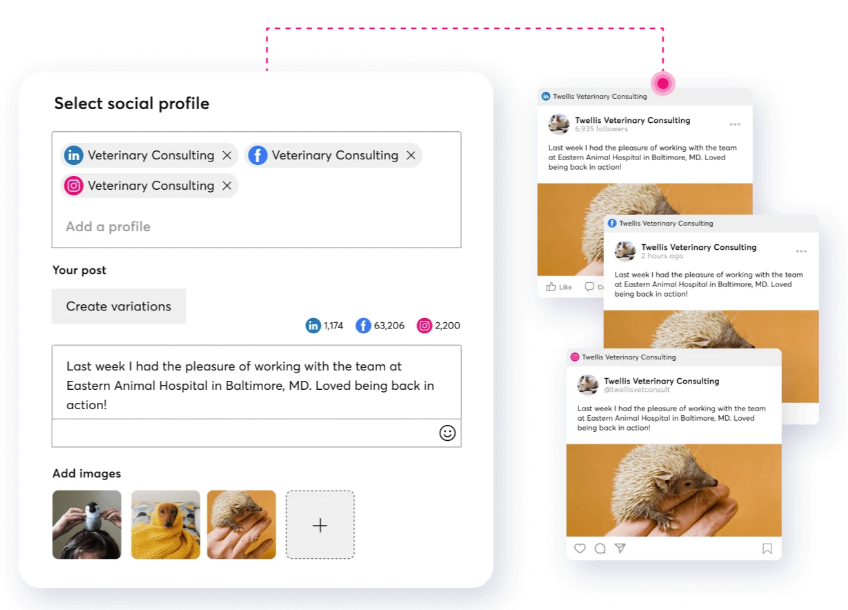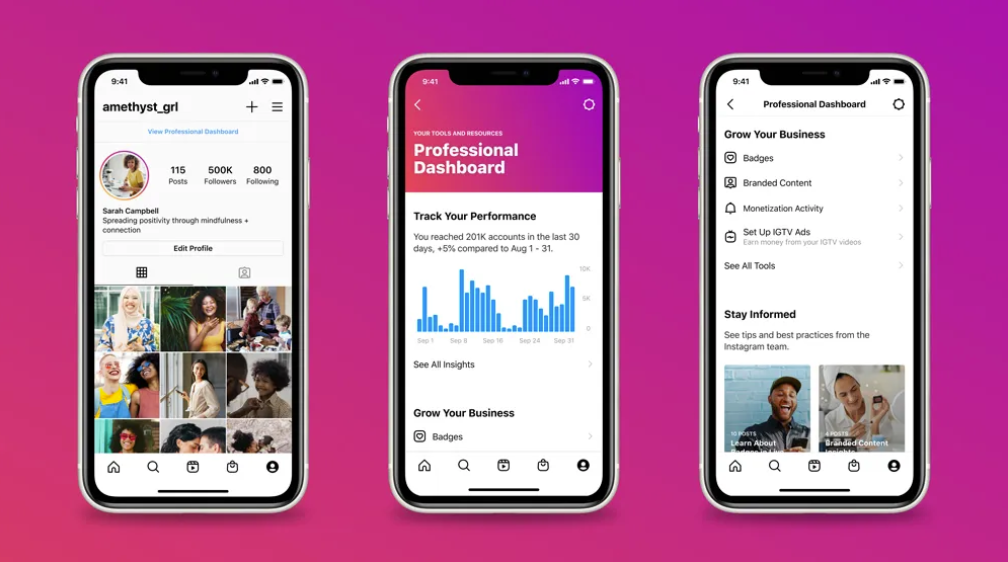
Get our latest social media resources delivered straight to your inbox. Subscribe to our Hints & Tips newsletter.
No one’s born with a phone in their hands — and even if you were, technology is endlessly changing. Your digital marketing skills can always be refined and updated.
Before you make even one post on social media, take a breath. Many small- and medium-sized business owners jump into digital marketing without creating clear strategies and objectives that allow them to focus their time and resources for the greatest success. Some social media strategies involve little more than throwing spaghetti against the wall to see what sticks.
The first lesson in any social media course is the necessity of a written and comprehensive marketing plan.
But this is a social media training for beginners, so don’t worry: Each of the sections below, which you’ll use to build your marketing plan, will link to articles where you can learn more in detail. In fact, it’s a good idea to work section by section, researching concept and topics that interest you. It’s better to have a great social media marketing plan unfold over time than a lousy one done quickly.
Here’s the second lesson in this social media training course: You can change your plan if it doesn’t work. You’re not writing anything in stone, so relax and get comfortable with making that first draft. With practice and experience, marketing will get easier. Soon, you’ll be the one teaching social media classes!
Campaign objectives and goals
As you begin to brainstorm your social marketing strategy, remember the second lesson — both social media and your plan will likely change in the near future. So, as you work on your first campaign, create annual goals and quarterly objectives.
When you identify your goals, work with the acronym SMART:
- Specific
- Measurable
- Achievable
- Relevant
- Time-bound
As you consider what goals to set for your company, start by getting very specific. It’s one thing to say you want more customers, and it’s another to have a goal of increasing your conversion rate by 20% by the end of the quarter. Make sure to connect your goals with your long-term business strategies.
Have confidence with big goals such as increasing your brand awareness, driving more traffic to your website, boosting sales, or improving customer engagement. To achieve these big goals, break down the work into measurable objectives. These may include giveaway raffles, monthly challenges, or digital ad campaigns.
When you clearly define your end goals and objectives, it’s easier to see what works and what needs improvement. Each campaign will offer its own lessons, through which you can refine your overall strategy for improved success.
Target audience and personas
Once you have decided on your goals and objectives, the next step in developing a social media plan is to identify your ideal target audience. It is a common mistake to want “everyone” to be a customer. In reality, there are specific people you should gear your products and services toward. Understanding these people will make it much easier for you to market your brand to them.
To understand your target audience, create what’s known as a detailed buyer persona. This is like an avatar or a fictional character who serves as a face you can “talk” to in your marketing. Based on data from current or desired customers, determine this person’s demographics, interests, behaviors, and — perhaps most importantly — pain points. This will be invaluable as you go on to the next step.
Content strategy
Once you’ve established who to target with your social media posts, blogs, and other online content, you can create a plan for the topics you know they’ll care about. It may be tempting to figure out what you want to publish as the time comes, but time spent creating a plan will save you from future scrambling.
Start by deciding what kind of content you’d like to create. This could be:
- Product or service posts
- Helpful tips
- Behind-the-scenes look at your business
- Links to blog posts
- Videos
- Infographics
“Having a social media strategy is crucial to ensure that you are working to support your broader business goals. Think of a social media strategy as a road map that will get you to your destination. Maybe that destination is more followers or more engagement…the best part? You can go on multiple road trips!”
Jessica Carroll – Senior Social Media Specialist, Constant Contact
Next, create a spreadsheet outlining the type, theme, and timeline for creating and publishing your content. If you plan to work in a team, write out editorial guidelines regarding voice and tone so everyone is on the same page. That’s also helpful when integrating curated content into your social media posts.
Platform selection
Where does your target audience spend its time? When just starting out on social media marketing, pick one platform to focus on. It can take time to get comfortable creating, planning, and posting, so master one platform before expanding your reach to the next.
Popular platforms include:
Determining which social media platform is right for your business is an individual decision, but you also look to your competition. If your research shows they are engaging a similar audience on a specific platform, you may find success there, too.

Paid advertising strategy
Organic content, defined as free posts, has a powerful ability to help a company grow and sustain a presence on social media, but you may find that it can take time to build. That’s where a paid advertising strategy can help. Paid ads, with the direct targeting options, offer more control over who is seeing your content — and how frequently, too.
After all, social media is its own business, and its strategy is to encourage businesses like yours to pay for digital advertising. Plus, influencers — private individuals who have gained a larger following — charge for partnerships with brands they align with. Decide if and how you’ll use your budget for these opportunities.
There are plenty of options to integrate a paid advertising strategy into one of your quarterly objectives. Perhaps you’d like to run sponsored posts, display ads, or work with an influencer.
You may also want to determine if Google Ads are worth it for your small business. The good news is these ads are often pay-per-click, so a narrowly focused target audience will mean the clicks you pay for will have a higher rate of return.
Creative assets
Now it’s time for the fun part — getting creative! You have a plan and you’re ready to execute it. Depending on your team size, you may need to schedule the work. As an alternative, you can work with marketing professionals, writers, or graphic designers to make your visions a reality.
A great tool to help design beautiful images is Canva, which you can directly integrate into social media and email marketing campaigns.
As you create visually appealing graphics, videos, and other multimedia elements for your business social media page, remember to always return to your content strategy. Be critical as you produce your work to reaffirm that it meets your goals.
Community management
If your posts or paid advertisements resonate with your target audience, you’ll likely discover your business is gaining followers. However, the engagement process can get messy if you don’t establish interaction guidelines.
Tip: Link your social media accounts to your Google Business profile to grow your audience and encourage engagement from search engine queries.
Analytics and metrics
As you work through the plan, you’ll want to track whether you’re reaching your goals. To do this, establish key performance indicators, or KPIs. These are metrics you can use to determine success. Track one or two that align closely with your objectives, such as:
- Engagement rate: likes, comments, shares, followers
- Click-through rate
- Conversion rate
- Return on investment, or ROI
It can take time for social media marketing to see success, so be patient as you first begin. But after a quarter or two, reassess your campaign if your metrics aren’t showing the results you seek.
Monitoring and tracking
A good thing about social media marketing is that each platform offers tools to measure social media performance. Make a habit of looking at the insights available on the backend of your business page to see whether you are getting the engagement you’d like.
Plus, monitor your industry on a national or even international level. Create a Google alert to track brand mentions in the media or competitor activity. Stay up to date with the trends in your industry and prepare yourself to pivot your campaign if necessary.

Instagram’s professional dashboard gives you access to key insights and metrics to help you make informed decisions for your brand and social media strategy. Image source: Instagram
Influencer outreach (if applicable)
Some brands naturally work perfectly with influencers, who sign contracts for mentions of the brand on their social media profiles. If your target audience responds well to this marketing, look for the right influencers for your brand. When you identify and collaborate with someone popular who aligns with your business model, you can promote your campaign to a larger and more relevant audience.
Budget and resources
Of course, most of these steps will cost money. It’s worth mentioning that you’ll need to allocate a budget for your campaign. Items that may cost money include:
- Content creation
- Advertising costs
- Tools such as graphic design software
- Personnel to manage accounts
Like everything in business, you’ll need to weigh social media marketing against your other marketing areas. Email marketing, for example, also has an excellent ROI. You may want to focus your budget on one type for half the year, then switch to see which provides better results.
Timeline and milestones
Success in marketing rarely happens overnight, so stay realistic as you set timelines for your campaign work. It is rare to hit it big with viral success. Instead, it’s most common for brands to slowly work through milestones and deadlines to launch many campaigns before their reach grows.
Have a calendar for the next quarter or two, so you’ll know when you’ve reached milestones and whether you’re on track with your plan. This also helps to make sure you are consistent with your brand presentation.
Testing and optimization
If you don’t see the results you want, one way to figure out how to move forward is by using what’s known as A/B testing. This is simply varying one element of an ad or a post to see what resonates better.
A/B testing involves a scientific mind. Test one section of your social media at a time. For example, start by trying two different phrases as headlines, then test two different designs, then test whether one platform works better than another. Refine what works best for your company, and revise your plan to maximize your results.
Compliance and legal considerations
Ensure that your campaign follows all relevant laws and regulations. For example, you can’t copy and paste an image from another social media account and claim it as your own. You need to follow all copyright, privacy, and advertising standards. These can vary by industry and by platform, so research the law before a crisis happens.
For example, if you are working with an influencer for a campaign, they will need to add a hashtag that explicitly shows that they have a financial relationship with your company. Or if you hold a giveaway on your social media page, you still need to have the same “fine print” that explains no purchase is necessary to win.
Reporting and evaluation
At the end of each campaign, schedule time to crunch the numbers to see how the metrics align with your baseline. You may also need to report the campaign’s progress and insights to stakeholders in your organization. Review the work to determine if you’ve reached your goals and how you can improve your social media marketing plan for the next quarter and beyond.
Ready to get started?
Now that you have worked you way through this social media training guide, the first step to having an effective social media marketing plan is to schedule dedicated time for the planning process. Start with just two hours set aside with the most creative people on your team, then work through each step of your strategy.
Remember, you can do some of this work in combination with what you’re already doing. For example, social media automation can work with your email marketing plans. This will be plenty of work, but you won’t have to reinvent the wheel. Most importantly, it will be worth it as you see your business grow.
Looking for more? Check out these articles to gain an in-depth understanding of Facebook, Linkedin, and Google Business Profile.





